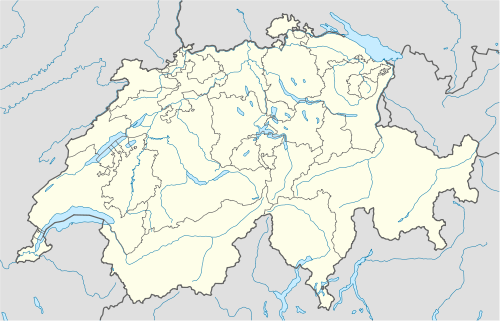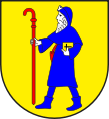Bever, Switzerland
| Bever | ||
|---|---|---|
 | ||
| ||
 Bever | ||
|
Location of Bever  | ||
| Coordinates: 46°33′N 9°53′E / 46.550°N 9.883°ECoordinates: 46°33′N 9°53′E / 46.550°N 9.883°E | ||
| Country | Switzerland | |
| Canton | Graubünden | |
| District | Maloja | |
| Area[1] | ||
| • Total | 45.75 km2 (17.66 sq mi) | |
| Elevation | 1,708 m (5,604 ft) | |
| Population (Dec 2013[2]) | ||
| • Total | 633 | |
| • Density | 14/km2 (36/sq mi) | |
| Postal code | 7502 | |
| SFOS number | 3781 | |
| Surrounded by | Bergün/Bravuogn, Bivio, La Punt-Chamues-ch, Marmorera, Samedan, Sankt-Moritz, Silvaplana, Sur, Tinizong-Rona | |
| Website |
www SFSO statistics | |
Bever (Romansh: ![]() [ˈbevəɾ] ; German and official until 1943 Bevers) is a municipality in the district of Maloja in the Swiss canton of Graubünden.
[ˈbevəɾ] ; German and official until 1943 Bevers) is a municipality in the district of Maloja in the Swiss canton of Graubünden.
History
Bever is first mentioned in 1139 as ad Bevero.[3]
Geography


Bever has an area, as of 2006, of 45.7 km2 (17.6 sq mi). Of this area, 14.5% is used for agricultural purposes, while 14.9% is forested. Of the rest of the land, 1.3% is settled (buildings or roads) and the remainder (69.3%) is non-productive (rivers, glaciers or mountains).[4]
The municipality is located in the Oberengadin sub-district of the Maloja district. It is located on the Inn River. It consists of the village of Bever and the hamlet of Spinas at the entrance to the Albula Tunnel. Until 1943 Bever was known as Bevers.[5]
Demographics
Bever has a population (as of 31 December 2013) of 633.[2] As of 2008, 15.3% of the population was made up of foreign nationals.[6] Over the last 10 years the population has grown at a rate of 6.1%.[4]
As of 2000, the gender distribution of the population was 51.5% male and 48.5% female.[7] The age distribution, as of 2000, in Bever is; 77 children or 12.2% of the population are between 0 to 9 years old. 54 teenagers or 8.6% are 10 to 14, and 41 teenagers or 6.5% are 15 to 19. Of the adult population, 81 people or 12.8% of the population are between 20 to 29 years old. 101 people or 16.0% are 30 to 39, 115 people or 18.2% are 40 to 49, and 95 people or 15.1% are 50 to 59. The senior population distribution is 32 people or 5.1% of the population are between 60 to 69 years old, 29 people or 4.6% are 70 to 79, there are 6 people or 1.0% who are 80 to 89.[6]
In the 2007 federal election the most popular party was the SP which received 34.8% of the vote. The next three most popular parties were the SVP (30.9%), the FDP (20%) and the local, small right-wing parties (7.5%).[4]
The entire Swiss population is generally well educated. In Bever about 80.5% of the population (between age 25-64) have completed either non-mandatory upper secondary education or additional higher education (either university or a Fachhochschule).[4]
Bever has an unemployment rate of 0.62%. As of 2005, there were 18 people employed in the primary economic sector and about 7 businesses involved in this sector. 142 people are employed in the secondary sector and there are 5 businesses in this sector. 138 people are employed in the tertiary sector, with 32 businesses in this sector.[4]
The historical population is given in the following table:[3][7]
| year | population |
|---|---|
| 1850 | 181 |
| 1888 | 151 |
| 1900 | 407 |
| 1950 | 227 |
| 1960 | 234 |
| 1970 | 367 |
| 1980 | 432 |
| 1990 | 496 |
| 2000 | 631 |
Languages
Most of the population (as of 2000) speaks German (66.6%), with Romansh being second most common (18.9%) and Italian being third (11.7%).[4] Until the mid 19th Century, the entire population spoke the Upper-Engadin Romansh dialect of Puter. Due to increasing trade with the outside world, Romansh usage began to decline. In 1880 about 81% spoke Romansh as a first language, while in 1910 it was only 59%. The last time that Romansh was the majority language in Bever was in 1941. Following World War II German became the clear majority language. However, in the 1990s many German speakers moved away from the village causing the percentage of Romansh speakers to increase. In 1990 there were 47% who understood Romansh in Bever and in 2000 it was 45%.
| Languages in Bever | ||||||
| Languages | Census 1980 | Census 1990 | Census 2000 | |||
| Number | Percent | Number | Percent | Number | Percent | |
| German | 175 | 40.51% | 292 | 58.87% | 420 | 66.56% |
| Romansh | 156 | 36.11% | 120 | 24.19% | 119 | 18.86% |
| Italian | 87 | 20.14% | 73 | 14.72% | 74 | 11.73% |
| Population | 432 | 100% | 496 | 100% | 631 | 100% |
References
- ↑ Arealstatistik Standard - Gemeindedaten nach 4 Hauptbereichen
- ↑ 2.0 2.1 Swiss Federal Statistics Office – STAT-TAB Ständige und Nichtständige Wohnbevölkerung nach Region, Geschlecht, Nationalität und Alter (German) accessed 18 August 2014
- ↑ 3.0 3.1 Bever in German, French and Italian in the online Historical Dictionary of Switzerland.
- ↑ 4.0 4.1 4.2 4.3 4.4 4.5 Swiss Federal Statistical Office accessed 20-Oct-2009
- ↑ Amtliches Gemeindeverzeichnis der Schweiz published by the Swiss Federal Statistical Office (German) accessed 23 September 2009
- ↑ 6.0 6.1 Graubunden Population Statistics (German) accessed 21 September 2009
- ↑ 7.0 7.1 Graubunden in Numbers (German) accessed 21 September 2009
| Wikimedia Commons has media related to Bever, Switzerland. |
External links
- Bever official website
- Ottavio Clavuot: Bever in Romansh, German, French and Italian in the online Historical Dictionary of Switzerland.
| ||||||||||||
